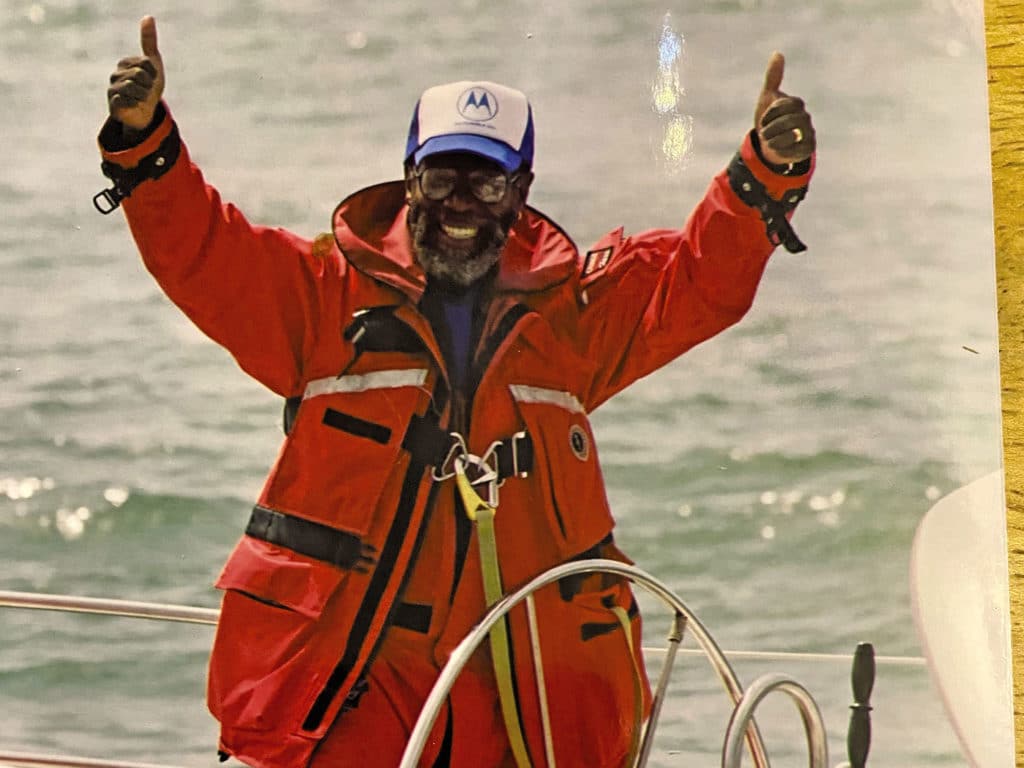
Bill Pinkney had a plan, and while it wasn’t exactly simple, it was pretty straightforward. The Chicago-based sailor, who spent his waterborne hours crewing on a Swan 44 race boat or pottering about Lake Michigan on his 28-foot Pearson Triton, was going to ramp up to a 35-footer and trick it out to sail alone around the world. The reason? He wanted to inspire his two grandchildren, to teach them by example what laid over the horizon, and what could be achieved if you put your mind to it.
He never set out to be a pioneer. Then he became one.
This past fall, the 86-year-old mariner was presented with a Lifetime Achievement Award from the National Sailing Hall of Fame in recognition of his two-year solo circumnavigation aboard his Valiant 47, Commitment, during which he became the first African American sailor to circle the globe via the five great southern capes. But that was only another chapter of his sailing odyssey. Next, he became the sailing master of Mystic Seaport’s replica cargo ship, Amistad—inspired by the movie of the same name—and skippered her on voyages from Halifax to Key West, and on to Cuba in commemoration of a historic slave revolt in Havana on the ship’s predecessor in 1839.
Pinkney found sponsorship for his circumnavigation on Commitment, which enabled the trip to have an educational component with a special curriculum that was undertaken by school children in Chicago and Boston. Amazingly, his original idea to teach a couple of kids in his family some lessons ultimately reached thousands.
At the outset, Pinkney’s plan was to circle the planet via the Panama and Suez canals (a voyage another Black sailor, Ted Seymour, had already accomplished). That changed after a trip to England prior to setting sail, and a chance meeting with the legendary Robin Knox-Johnston, the first man to sail around the world in the famous Golden Globe Race in 1968-1969.
“If you’re talking about solo sailing, I was meeting the lord!” Pinkney told me in an interview from his home in Puerto Rico. “And he said: ‘Look, you’re a Black guy. It’s not going to be a big thing if you cross the Atlantic and go through the canals, and the day after you finish, another Black guy does the same voyage but around Cape Horn. They’ll never know your name. If you’re going to do it, do it like a bloody man!’ So, the lord told me what to do. I had no choice. And it turned out, he was right.”
There were highlights all along the way. In South Africa, he sailed past Robben Island—the notorious prison island from which Nelson Mandela had just recently been released—flying a red, black and green spinnaker, the colors of the African liberation movement. There was the wicked knockdown in a microburst in the Southern Ocean, which doused the interior of Commitment in Vermont maple syrup and took weeks to mop up.
But the very end of the voyage, when he came alongside the dock at Boston’s Constitution Wharf and was greeted by high school students “as far as the eye could see,” was unforgettable. So too was the reception aboard USS Constitution—“Old Ironsides”—soon after his arrival. “I come up the gangway and turn and salute the ensign and officer of the deck,” he recalled. “The loudspeaker goes, ‘Commitment. Arriving.’ I almost lost it. Here I am, an eight-year Navy vet, an enlisted man, getting piped aboard the oldest ship in the United States Navy. And my ship, that I’d just sailed around the world, is recognized as I come aboard. That was a mind-blower.”
More recently, Pinkney has been involved with getting more people of color on the water, and for more than two decades, he helped lead annual flotillas of 20 or 30 boatloads of Black sailors from all over the country on charter vacations through the British Virgin Islands. But Pinkney wants to make one thing clear.
“I want to give kudos to the National Sailing Hall of Fame,” he said. “At no time, in any place, have I ever been mentioned as a Black sailor. No place. Only as a sailor. And that’s the identity that all of us who sail want. We’re sailors. Religion, sexuality, color—none of that has anything to do with the fact that, first and foremost, we’re sailors.”
Herb McCormick is CW’s executive editor.








